NewsBeat
Mabli Hall: Woman jailed for four years for causing eight-month-old baby’s death | UK News
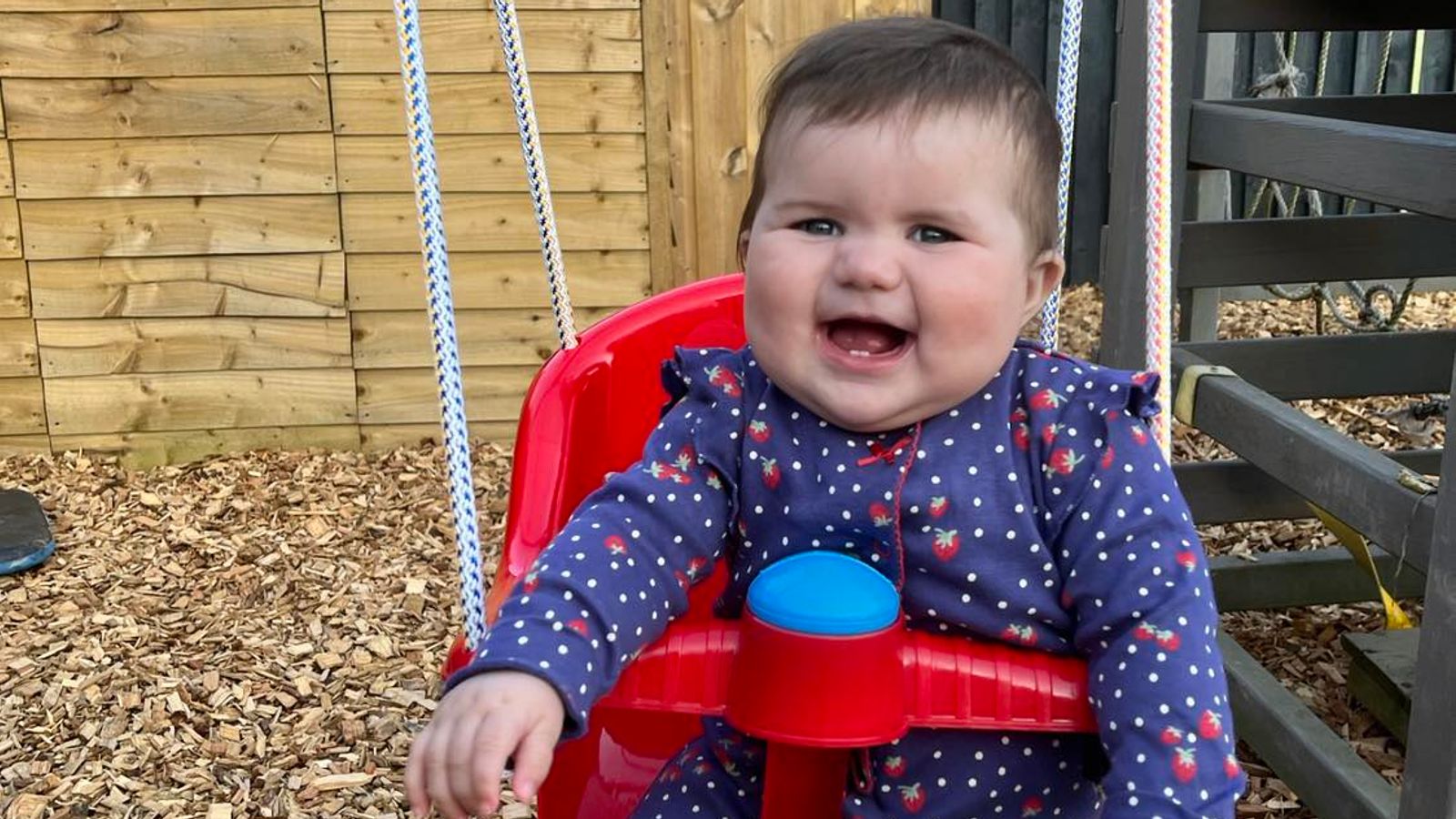
A woman has been sentenced to four years in prison for causing the death of an eight-month-old baby by dangerous driving.
Bridget Curtis, 71, had previously pleaded guilty to causing the death of Mabli Cariad Hall outside Withybush Hospital in Haverfordwest, Pembrokeshire.
Mabli was airlifted to the University Hospital of Wales in Cardiff after she was hit by a white BMW on Wednesday 21 June 2023.
She was later moved to Bristol Royal Hospital for Children where she died four days later.
‘Entirely tragic’
Swansea Crown Court heard Mabli and her family were visiting her grandmother, who was receiving end-of-life care at the hospital, when the crash happened.
Prosecuting, Craig Jones said it was an “entirely tragic” case.
He said Mabli was “very nearly nine months” when she died, a day when the weather conditions were “fine and dry”.
Mabli was with her father in a grassed area under some trees opposite the hospital’s entrance.
“Mr Hall put Mabli back into her pushchair and was adjusting the straps when he heard the sound of an approaching vehicle,” Mr Jones said.
The court heard that Curtis had given her daughter a lift to the hospital for an appointment and had stopped the car outside the main entrance.
After she was dropped off, her daughter went to retrieve her handbag from the back of the car but was “unable to see the bag and tapped the window to attract her mother’s attention”.
“With the engine running, [the defendant] turned around from her seat to look in the back,” he said.
“The defendant had failed to switch off the vehicle and had failed to place the car, which was an automatic-geared vehicle, into a parked setting.”
In a period of four and a half seconds, the vehicle reached a top speed of 29 miles per hour and travelled a distance of 28 metres.
‘So beautiful’
In a victim impact statement, Rob Hall told the court he remembered Mabli “smiling at [him], making her cute noises”.
He said the “violent revving, screeching tyres” of the car was something he saw and heard “daily”.
Mr Hall said that after Mabli’s death, his family “were numb, felt helpless and destroyed”.
“This struggle continues to this day, and will always be there. Life from then until now has been horrendous. It’s been so hard to live this life,” he said.
“It’s exhausting, we’re drained, and I just don’t know how we recover from such trauma.”
Mabli’s mother, Gwen Hall, also read a victim impact statement from the witness box, telling the court the day Mabli died was the day her life “irreversibly changed for the worse”.
“She had said ‘Mamma’ for the first time only the day before,” she said.
Ms Hall said the family was “heartbroken”, but that the word “does not do justice to how broken and destroyed we are as a family”.
“Everyone needs to remember that Mabli was eight months old, she was so bright, so beautiful and so full of love and life. She was the apple of all our eye,” Ms Hall added.
“She was my best friend, my shadow, my second skin.”
‘Devastation of their lives’
In mitigation, Mr John Dye said the defendant had “led a blameless, law-abiding life”.
He said she had shown “extremely genuine remorse” and had written a letter to Mabli’s family.
The court heard Curtis had “ongoing mobility issues” and had caring responsibilities for her adult daughter.
Handing down his sentence of four years in prison, Judge Geraint Walters said “loving parents, siblings and a wider extended family suffered the devastation of their lives”.
“That is because that day, they suffered that which each parent dreads, the loss of a much-cherished child, then just eight months old,” he said.
“Her life was taken from her senselessly, and indeed needlessly, as a result of your actions.”
The judge said the case was aggravated by the fact that others were struck by the vehicle, namely Mabli’s father and uncle.
As well as the custodial sentence, Curtis was also disqualified from driving for eight years and would have to undergo a driving test before she could re-apply for a licence.
Addressing the media outside court, Mabli’s grandfather, Paul Sambrook, thanked “everyone who [had] been part of the process to secure justice for Mabli Cariad”.
“We’ve waited over 18 months for this day and finally this nightmarish chapter has come to an end,” he said.
“We’ll go home now and start to live our lives without Mabli. She was the sunshine who lit up our lives in so many ways, but now we have to focus on helping the other children of the family to cope with the loss and find a new way forward.
“If there is anything to learn from the pain and bereavement, this is what it is. Take care every time you sit behind the wheel of your car, think carefully about your own safety as well as the safety of others.”
Read more from Sky News:
Southport killer jailed for life with minimum of 52 years
Rare red warning for parts of UK as Storm Eowyn arrives
Iwan Jenkins from CPS Wales told Sky News that nothing could change “the tragic events of that day”.
“Although the criminal case has concluded, our thoughts remain with Mabli’s family over their heart-breaking loss and with everybody who received injuries on that day,” he added.
NewsBeat
The missed chances to stop Southport killer Axel Rudakubana
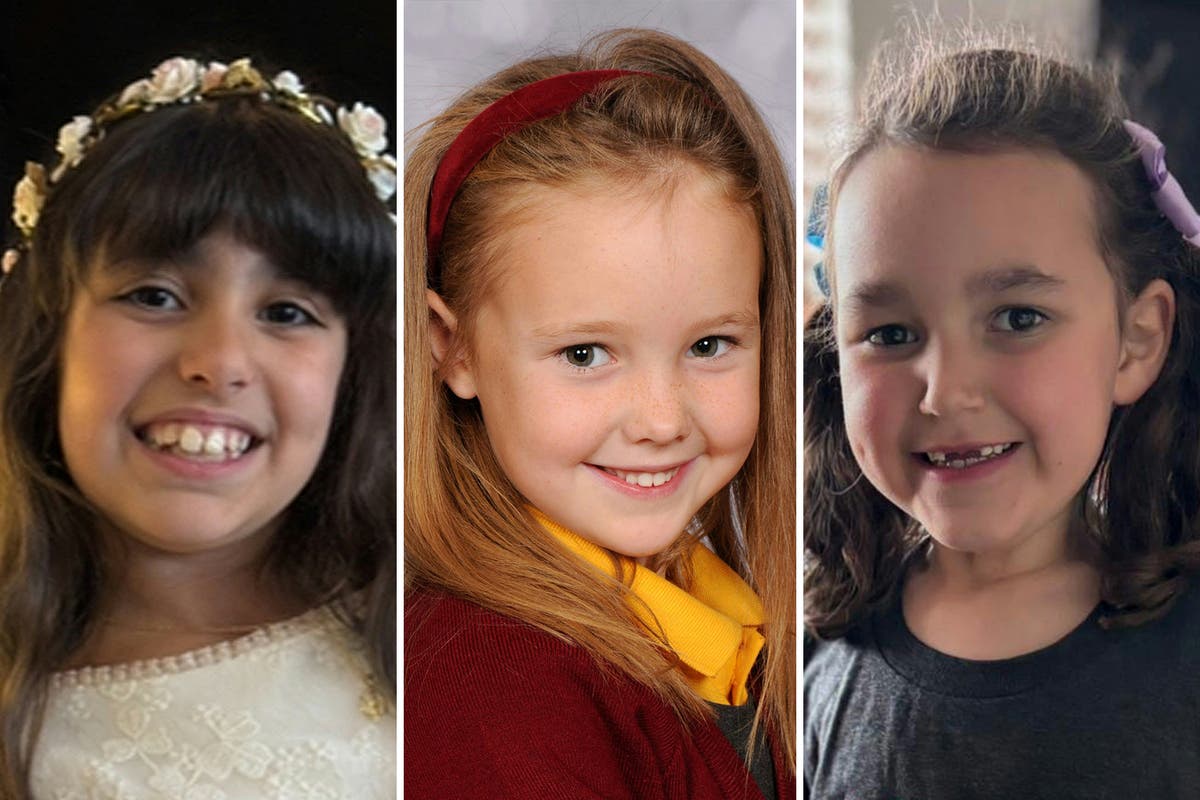
A public inquiry will be held into the murders of three girls at a Taylor Swift-themed dance class in Southport by 18-year-old Axel Rudakubana “that can get to the truth about what happened and what needs to change”.
The announcement came after it emerged Rudakubana was referred to an anti-extremism programme three times before he carried out the murders, and endangered his former teachers and peers.
Home secretary Yvette Cooper confirmed the 18-year-old had “contact with a range of different state agencies throughout his teenage years” before carrying out his “meticulously planned rampage”.
Ms Cooper said in a statement: “He was referred three times to the Prevent programme between December 2019 and April 2021 aged 13 and 14.
“He also had contact with the police, the courts, the Youth Justice system, social services and mental health services.
“Yet between them, those agencies failed to identify the terrible risk and danger to others that he posed.”

Announcing the inquiry, Ms Cooper continued: “Although, in line with CPS advice to preserve the integrity of the prosecution, we were constrained in what we were able to say at the time, the Home Office commissioned an urgent Prevent Learning Review during the summer into the three referrals that took place and why they were closed.
“We will publish further details this week, alongside new reforms to the Prevent programme.
“But we also need more independent answers on both Prevent and all the other agencies that came into contact with this extremely violent teenager as well as answers on how he came to be so dangerous, including through a public inquiry that can get to the truth about what happened and what needs to change.”
The 18-year-old pleaded guilty to the attack on the first day of his trial. The teenager from Banks, Lancashire, admitted 16 offences, including three counts of murder and 10 counts of attempted murder at Liverpool Crown Court on Monday.
Sir Keir Stamer said there are “grave questions” to answer about how the state failed the Southport murder victims. The prime minister welcomed the news that Rudakubana pleaded guilty and pledged to “leave no stone unturned” in investigating why the attack had not been prevented.
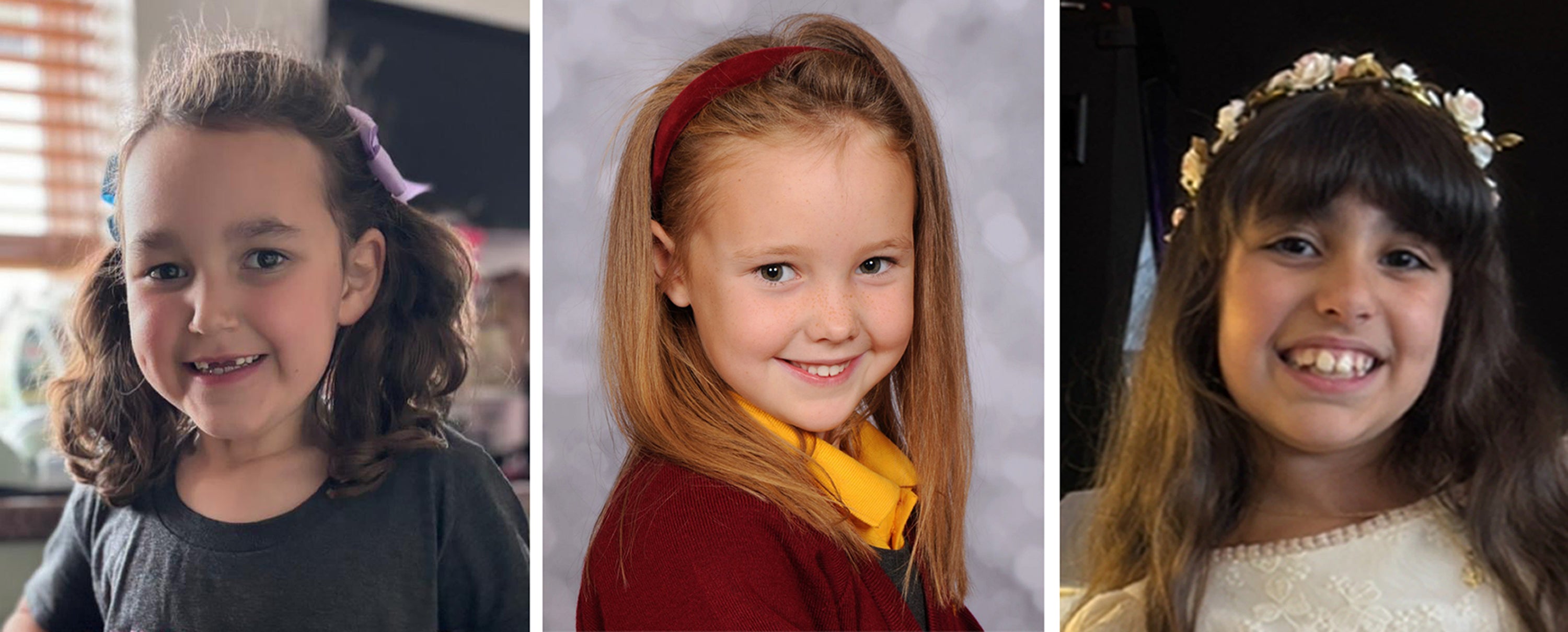
Alice da Silva Aguiar, nine; Bebe King, six; and Elsie Dot Stancombe, seven; died following the attack at the dance class in The Hart Space on a small business park in the seaside town shortly before midday on 29 July.
The defendant admitted their murders as well as the attempted murders of eight other children, who cannot be named for legal reasons, class instructor Leanne Lucas and businessman John Hayes.
A week before launching a knife attack on the dance class, Rudakubana had attempted to travel to his former school as pupils broke up for the summer holidays.
The 18-year-old booked a taxi to go to Range High School in Formby on 22 July, The Independent understands, seven days before he would travel by taxi to The Hart Space in Southport.
On both occasions, he is said to have been wearing the same outfit – a green hooded sweatshirt with the hood pulled up, despite the summer temperatures, and a surgical mask.
Ten minutes after his taxi was booked, at 12.30pm, pupils were due to leave the school premises on their last day of term, it is understood.
On 22 July, however, his father followed him out of the house and pleaded with the taxi driver not to take him.
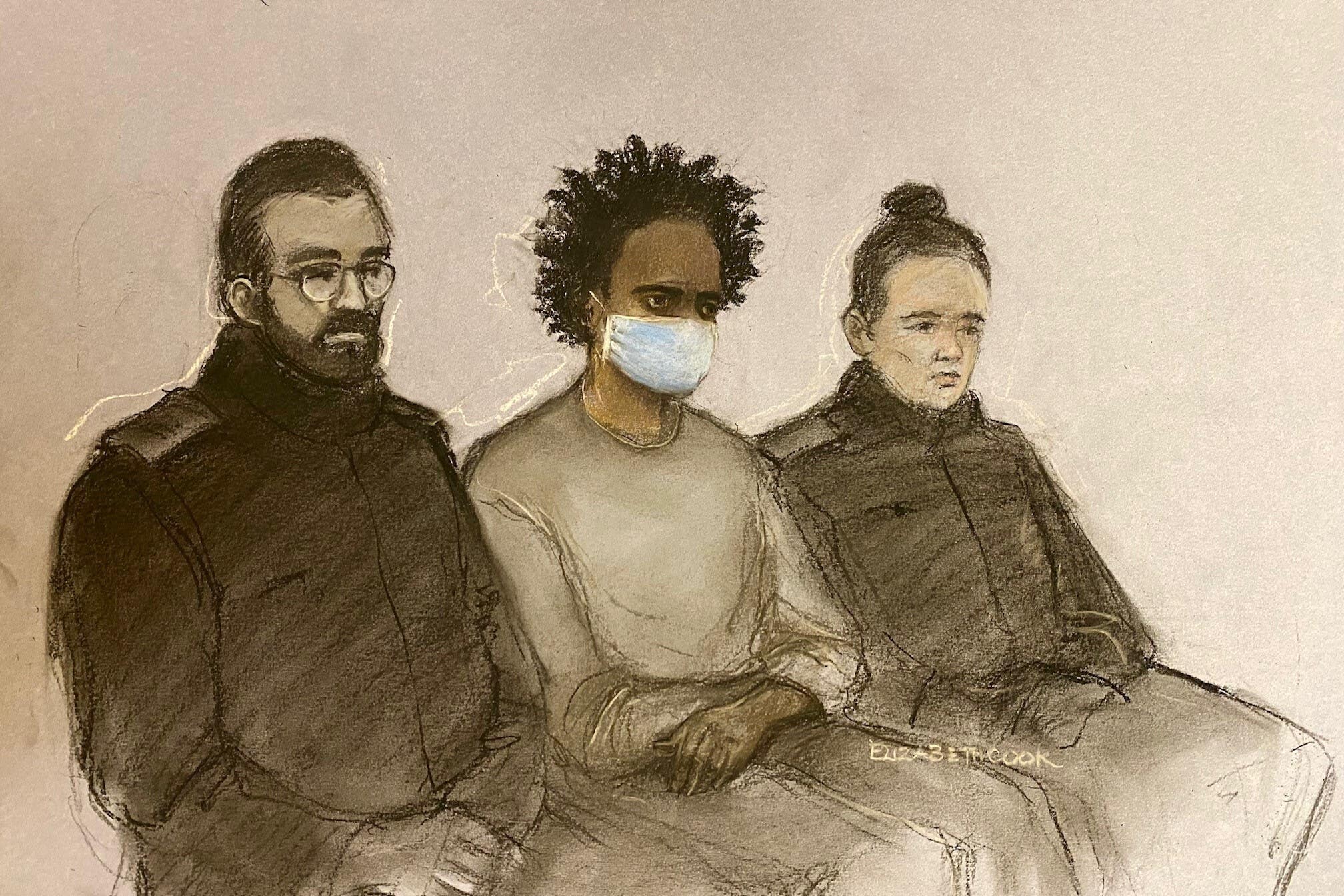
Rudakubana was permanently excluded from the secondary school over claims he was carrying a knife and later returned to attack someone with a hockey stick, it is understood.
Aged 17 at the time of the attack, Rudakubana was born in Cardiff to Rwandan parents and had moved with his family to the village of Banks in Lancashire about a decade ago.
Neighbours described the family as unremarkable, but it can now be reported that teachers had concerns about his behaviour from when he entered Year 9.
Rudakubana was excluded in around 2019 after telling Childline that he was being racially bullied and was bringing a knife into school to protect himself, it is understood.
It is not known if he was being bullied or if he ever brought a weapon into the school while he was a pupil.
After his exclusion, he returned to the school and assaulted someone with a hockey stick, the intended target being a former bully or someone he had a grievance with, it is understood. Rudakubana then attended two specialist schools, The Acorns School in Lancashire and Presfield High School & Specialist College in Southport, and teachers were concerned about his behaviour. His in-person attendance at Presfield was less than 1 per cent.
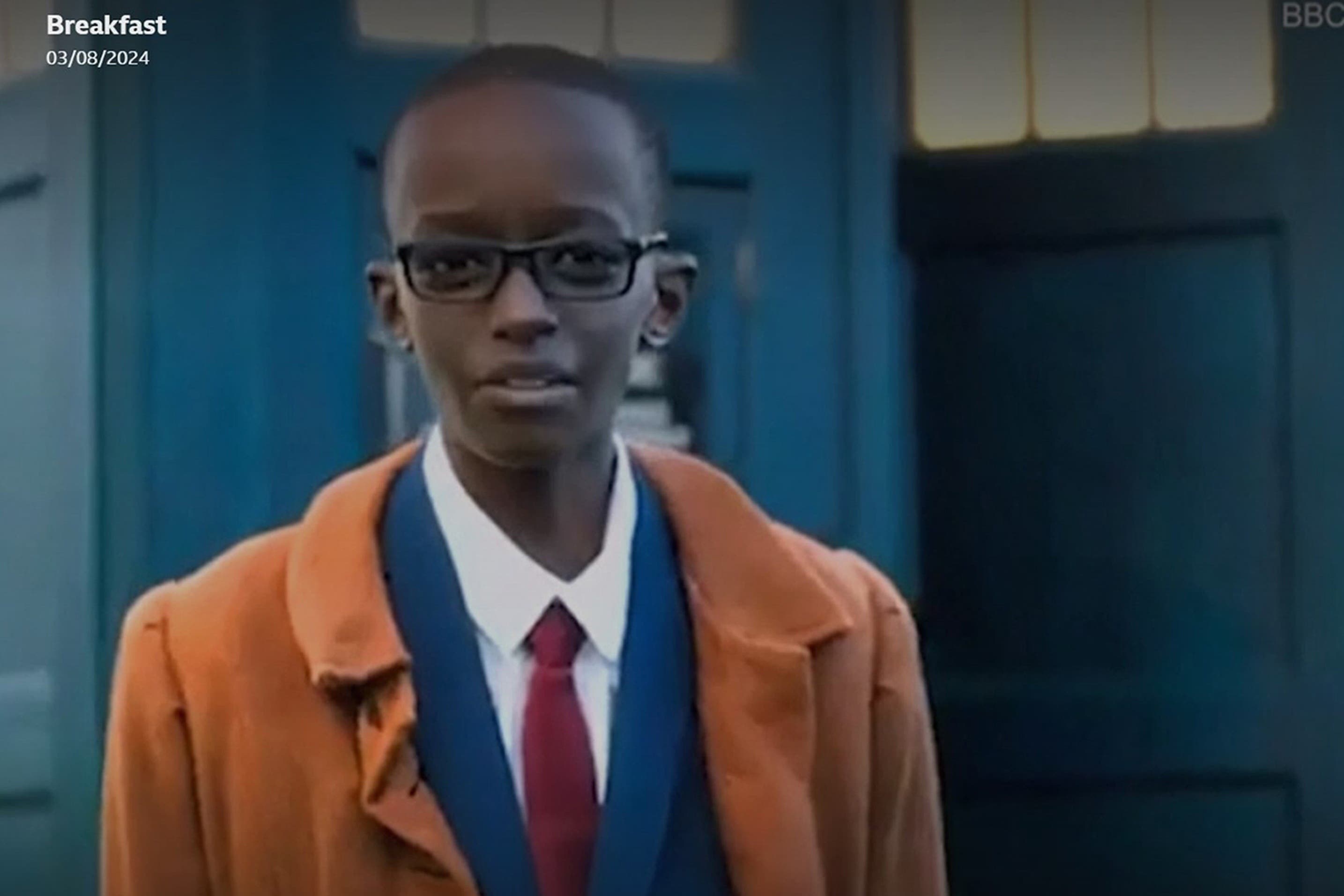
In a statement on Monday, prime minister Keir Starmer said: “The news that the vile and sick Southport killer will be convicted is welcome.
“It is also a moment of trauma for the nation, and there are grave questions to answer as to how the state failed in its ultimate duty to protect these young girls.
“Britain will rightly demand answers, and we will leave no stone unturned in that pursuit.”
Tory leader Kemi Badenoch said ministers must give a “complete account” of who “knew what and when” about Rudakubana, as she piled pressure on the government.
Mr Justice Goose said Rudakubana will be sentenced on Thursday.
He is not expected to receive a whole life order because he was 17 at the time of the murders – the measures can normally only be imposed on criminals aged 21 or over, and are usually only considered for those aged 18 to 20 in exceptional circumstances.
Rudakubana also admitted possessing a knife on the date of the attack, production of a biological toxin, ricin, on or before 29 July and possession of information likely to be useful to a person committing or preparing to commit an act of terrorism.
The terrorism offence relates to a PDF file entitled Military Studies In The Jihad Against The Tyrants, The Al Qaeda Training Manual which he is said to have possessed between 29 August 2021 and 30 July 2024.
The ricin, a deadly poison, and the document were found during searches of the home in Old School Close which he shared with his parents, who are originally from Rwanda.
NewsBeat
Keely Hodgkinson: Olympic 800m gold medallist voted 2024 Sunday Times Sportswoman of the Year

Olympic 800m gold medallist Keely Hodgkinson has been voted the 2024 Sunday Times Sportswoman of the Year.
The 22-year-old ended her wait for a global title with victory at the Olympic Games in Paris last summer and won BBC Sports Personality of the Year in December 2024.
Hodgkinson also retained her European 800m title and became the sixth-fastest woman of all time when she improved her British record to one minute 54.61 seconds at the London Diamond League.
Hodgkinson follows last year’s winner, England goalkeeper Mary Earps, athlete Eilish McColgan, and tennis player Emma Raducanu, who won in 2021.
The shortlist for the 2024 award was dominated by Olympic medal winners with Hodgkinson scooping it ahead of 1500m runner Georgia Bell, showjumper Laura Collett, cyclist Emma Finucane, heptathlete Katarina Johnson-Thompson, trampoline gymnast Bryony Page, shooter Amber Rutter and Paralympic cycling great Sarah Storey.
Elsewhere, diver Andrea Spendolini-Sirieix was named the newspaper’s Young Sportswoman of the Year after she won bronze in Paris.
Storey picked up the Disability Sportswoman of the Year after she added two more golds to her medal collection at the Paralympic Games.
Rowers Lauren Henry, Lola Anderson, Georgina Brayshaw and Hannah Scott won the Team of the Year for their dramatic victory in the women’s quadruple sculls at Paris 2024.
Ultra runner Jasmin Paris won the Helen Rollason Award for Inspiration, while retired PE teacher and cycling enthusiast Val French won the Grassroots Sportswoman of the Year.
BBC radio presenter Eleanor Oldroyd’s contribution to sports broadcasting was also recognised with a special Editor’s Choice Award.
Politics
Donald Trump ‘personally asked Boris Johnson’ to witness his swearing in while Nigel Farage ‘did not make the cut’

Donald Trump personally asked Boris Johnson to witness his swearing in as President, and has a “good working relationship” with him, says former Tory Security minister Tom Tugendhat.
Tugendhat, who was in Washington DC last week ahead of the President’s inauguration, said Trump has personally asked Johnson to be in the rotunda on Capitol Hill to witness personally his swearing in.
Earlier this week Nigel Farage, the leader of Reform UK, told GB News that he had not “made the cut” and been invited to sit in the Rotunda audience.
Tugendhat told today’s Chopper’s Political Podcast that he had been told by “members of the administration” that it was “a personal decision by the President” to invite Johnson to be there.

Donald Trump personally asked Boris Johnson to witness his swearing in as President, and has a “good working relationship” with him, says former Tory Security minister Tom Tugendhat
Getty
He said: “It is very clear to me that that was a personal choice by the president choosing people who he was close to, to be around him on the day.”
He added: “It wasn’t a large list. There’s not that many people can fit in there. And the President went through the list personally and removed some names and added [others].”
Tugendhat added that Johnson – who has in the past intimated he wants a way back into politics – “has had a very good working relationship with Donald Trump.

Tom Tugendhat, who was in Washington DC last week ahead of the President’s inauguration, said Trump has personally asked Johnson to be in the rotunda on Capitol Hill to witness personally his swearing in
GB News
“He’s got a lot of friends in Washington.
“He’s got a voice that reaches parts that other politicians don’t reach.”
Listen or watch Chopper’s Political Podcast on Apple Podcasts, Spotify or GB News’ YouTube channel.
NewsBeat
Moment ten-pint drink-driver confronted after leaving victim amputee | News
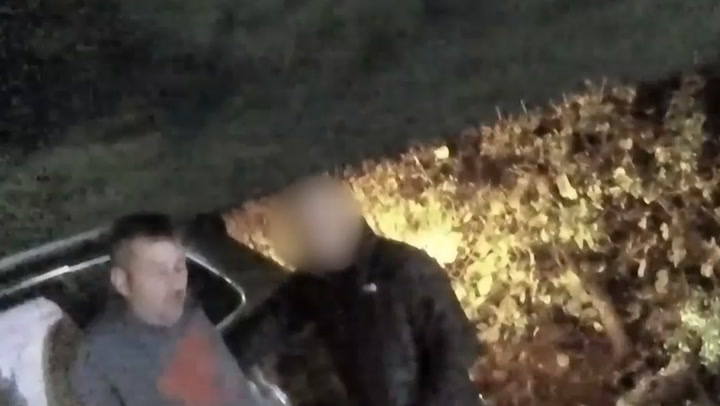

Bodycam footage shows police confronting a drink driver after he seriously injured two people in a collision near Bristol Airport, leaving one victim needing her arm amputated at the elbow.
Another victim suffered significant internal bleeding and bruising.
Leigh Brean, 43, of Lawrence Road, Wrington, was jailed for three years and two months and was told he was not allowed to drive for 11 years and seven months.
In five hours, he had drunk 10 pints before getting behind the wheel of the car.
He pleaded guilty to causing serious injury by dangerous driving and for failing to provide a specimen.
NewsBeat
‘My daughter’s bones were scattered on the ground’
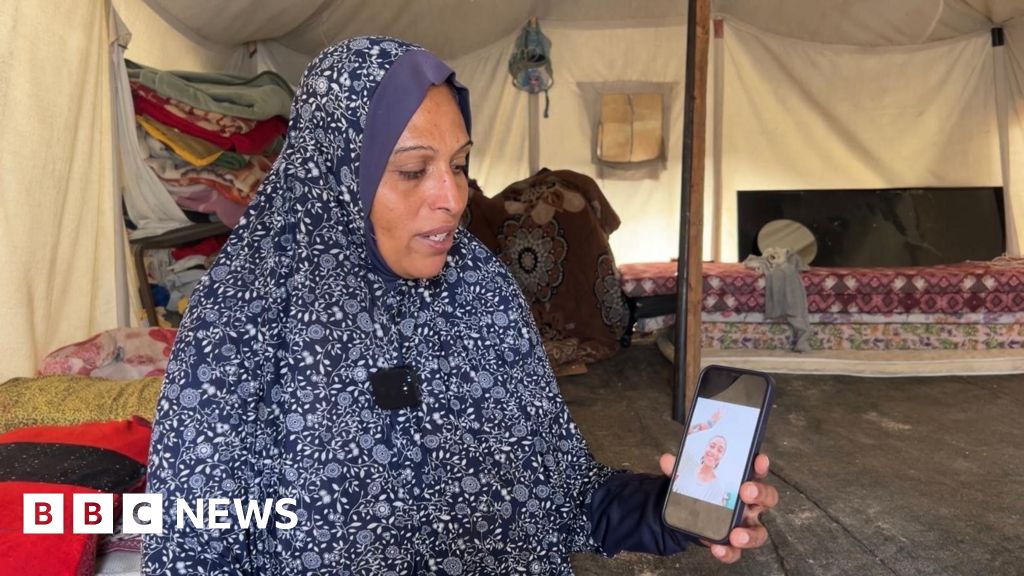
Special correspondent
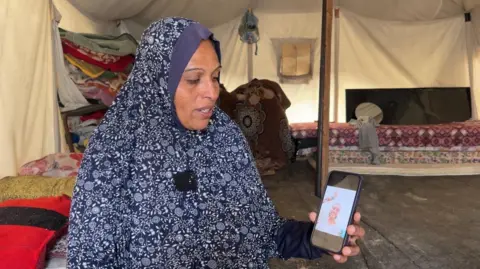 BBC
BBCEverything gets mixed up together. The child’s multi-coloured backpack. A running shoe. A steel pot perforated by shrapnel. Bits of beds, chairs, cookers, lampshades; the glass of broken windows, mirrors, drinking glasses. Scraps of clothing.
These last shredded, dust covered items can be markers. Often they belong to the dead lying near the surface of the rubble.
“Since the Israeli occupation forces withdrew from Rafah, we have had about 150 calls from civilians about the presence of their relatives’ bodies under houses,” says Haitham al-Homs, director of Emergency and Ambulance Services for the Civil Defence agency in Rafah, at the southernmost end of the Gaza Strip.
The Palestinian health authorities estimate that 10,000 people are missing. Where there is no obvious marker like clothing at the surface, the search teams rely on information from relatives and neighbours, or they follow the smell of death that radiates from the ruins.
WARNING: This story contains distressing content
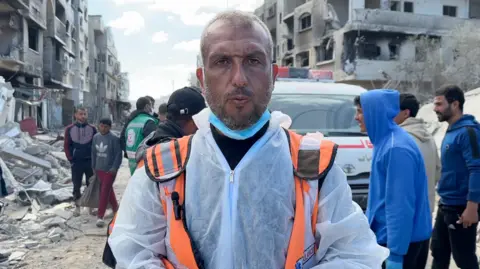
The Israeli government has banned the BBC and other international news organisations from entering Gaza and reporting independently. We depend on trusted local journalists to record the experiences of people like those who are searching for the missing.
At the end of every day, Mr Homs updates the list of those found. His team excavates the rubble with care, aware that they are searching for fragments of broken humanity. Often what is recovered is no more than a pile of bones. Israel’s high explosive bombs blasted and mangled into pieces many of the dead. The bones and scraps of clothing are placed in white body bags upon which Mr Homs writes the Arabic word “majhoul”. It means “unidentified”.
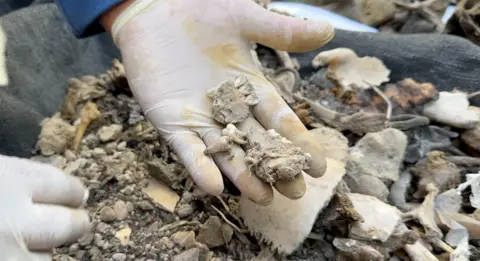
A resident of Rafah, Osama Saleh, went back to his home after the ceasefire and found a skeleton inside. The skull was fractured. Mr Saleh reckons the body lay there for four to five months. “We are humans with feeling…I can’t convey to you how miserable the tragedy is,” he says.
To be surrounded every day by the smell of decomposing bodies is a deeply unsettling experience, as those who have witnessed the aftermath of mass death will often testify.

“The bodies are terrifying. We are seeing terror,” Osama Saleh says. “I swear it is a painful feeling, I have cried.”
Families have also been arriving at hospitals to search for remains. In the courtyard of the European Hospital in southern Gaza, collections of bones and clothing are spread out on body bags.
Abdul Salam al-Mughayer, 19, from Rafah, went missing in the Shaboura area; according to his uncle, Zaki, it was a place you didn’t come back from if you went there during the war. “So, we didn’t go to look for him there for that reason. We wouldn’t have returned.”
Zaki believes a set of bones and clothes in front of him belong to the missing Abdul Salam. He is standing with a hospital worker, Jihad Abu Khreis, waiting for Abdul Salam’s brother to arrive.
“It’s 99% certain the body is his,” Mr Abu Khreis says, “but now we need the final confirmation from his brother, the closest people to him, to make sure that the trousers and shoes are his.”
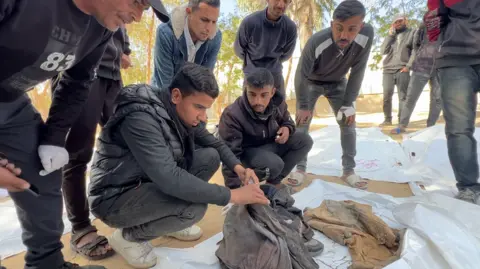
Soon after the brother arrived from the tented refugee camp of al-Mawasi, also in southern Gaza. He had a photograph of Abdul Salam on his phone. There was a photo of his running shoes.
He knelt before the body bag and pulled back the cover. He touched the skull, the clothes. He saw the shoes. There were tears in his eyes. The identification was complete.
Another family moved along the row of body bags. There was a grandmother, her son, an adult sister, and a toddler. The child was kept at the back of the group while the elderly woman and her son looked under the cover of the body bag. They stared for a few seconds and then embraced each other in grief.
After this, the family, helped by hospital workers, carried away the remains. They were weeping, but nobody cried aloud.
 Handout
HandoutAya al-Dabeh was 13 years old and was living with her family and hundreds of other refugees at a school in Tal al-Hawa, in Gaza City in the north. She was one of nine children.
One day at the start of the war Aya went to go to the bathroom upstairs at the school and – her family says – she was shot in the chest by an Israeli sniper. The Israel Defense Forces say they do not target civilians and blame Hamas for attacking from civilian areas. During the war the UN Human Rights Office said that that there has been “intense shooting by Israeli forces in densely populated areas resulting in apparently unlawful killings, including of unarmed bystanders.”
The family buried Aya beside the school, and her mother Lina al- Dabah, 43, wrapped her in a blanket “to protect her from the rain and the sun” in case the grave was disturbed and exposed to the elements.
When the Israeli military took over the school Lina fled south. She went with four other children – two daughters and two sons – to reunite with her husband who’d gone earlier with the couple’s other children. Lina had no option but to leave her daughter where she lay, hoping to come back and recover the remains for a proper burial once peace came.
“Aya was a very kind girl, and everyone loved her. She used to love everyone, her teachers and her studies, and she was very good at school. She wished well for everyone,” Lina says. When the ceasefire came Lina asked relatives still living in the north to check up on Aya’s grave. The news was devastating.
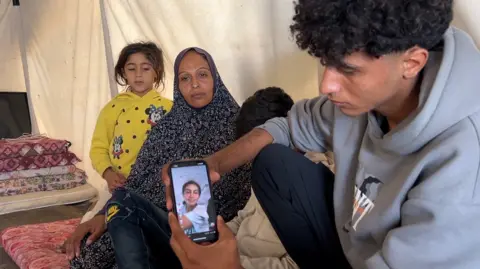
“They informed us that her head was in one place, her legs were in another, while her ribs were somewhere else. The one who went to visit her was shocked and sent us the pictures,” she says.
“When I saw her, I couldn’t understand how my daughter was taken out of her grave, and how did the dogs eat her? I can’t control my nerves.”
The relatives have collected the bones and soon Lina and her family will travel north to carry Aya’s remains to a proper grave. For Lina, there is grief with no end, and a question that has no answer – the same question that sits with so many parents who lost children in Gaza. What could they have done differently, the circumstances of the war being what they were?
“I couldn’t take her from where she was buried,” says Lina. Then she asks: “Where could I have taken her?”
With additional reporting by Malak Hassouneh, Alice Doyard, Adam Campbell.
NewsBeat
Cold weather payment: Over 1m households set for £25 – postcode checker and eligibility

More than a million cold weather payments have been triggered after the January cold snap, with some households set to receive up to £50 to go towards the cost of heating their home.
To help support people during freezing weather, the Department for Work and Pensions (DWP) runs the cold weather payment scheme for qualifying households. This is a one-off payment of £25 that is triggered for every seven-day period where the temperature in your area is at or below zero degrees.
In the week ending 17 January, there were 1.2 million of these payments triggered, a dramatic increase from 161,000 the week before. This means millions of households are set to get a £25 payment soon – with some will get even more as they felt the freezing weather for over two weeks.
Cold weather payments have been triggered for 793 postcode areas so far this year, most for the first time in January. These areas span across England and Wales, with most regions affected. Only the East of England, South West and London didn’t see the freezing weather last long enough to trigger any payments, for the most part.
Here is a map of all the latest areas to qualify:
Am I eligible for a cold weather payment?
You are eligible for the payment if you receive any of the following:
- Pension Credit
- Income Support
- Income-based Jobseeker’s Allowance (JSA)
- Income-related Employment and Support Allowance (ESA)
- Universal Credit
- Support for Mortgage Interest
You must also live in an area that has experienced seven days of zero or sub-zero temperatures.
The DWP uses its own equipment to measure temperatures across all UK postcodes. If you disagree with the judgement, it is possible to appeal directly to the department.
You do not qualify for this scheme if you live in Scotland, as the Scottish government has recently replaced the scheme with Winter Heating Payments.
When will I get the payment?
If you’re eligible, you will get these payments automatically. They should arrive in the same bank account you receive benefit payments, within 14 working days of the cold period.
If you believe you are eligible but have not received the payments, you should contact the DWP.
Full list of postcodes eligible for cold weather payment
Here are all the postcode areas where cold weather payments have been triggered since November:
Politics
Rupert Lowe skewers human rights lawyer over outrageous illegal immigrant demand: ‘Pork barrelling a living!’
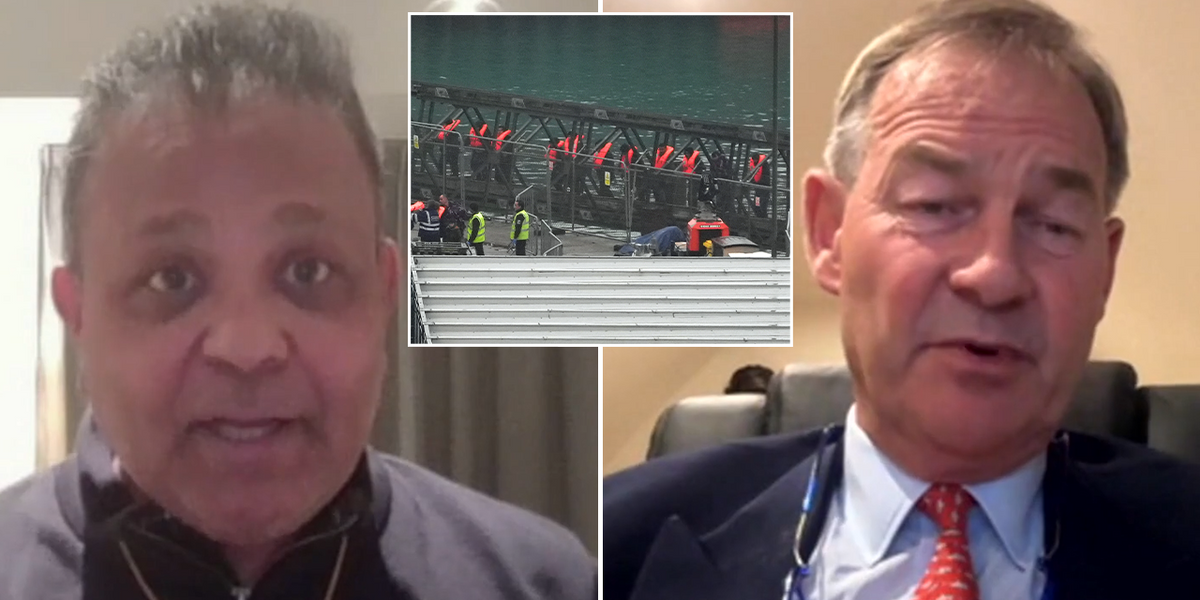
Reform UK MP Rupert Lowe has strongly rejected calls for an amnesty for illegal migrants in Britain, following suggestions by human rights lawyer Ivon Sampson.
Speaking on GB News, Sampson argued that offering an amnesty would enable better tracking of migrants, stating: “The only sensible thing to do is to offer an amnesty – then we have a sensible policy of ensuring those people who come in are tracked.”
Lowe hit back, saying: “These human rights lawyers pork barrel a living on the back of all this Tony Blair legislation which has created our problem.”
He called for tougher measures, suggesting migrants should be placed in “uncomfortable, untented camps” on remote islands.
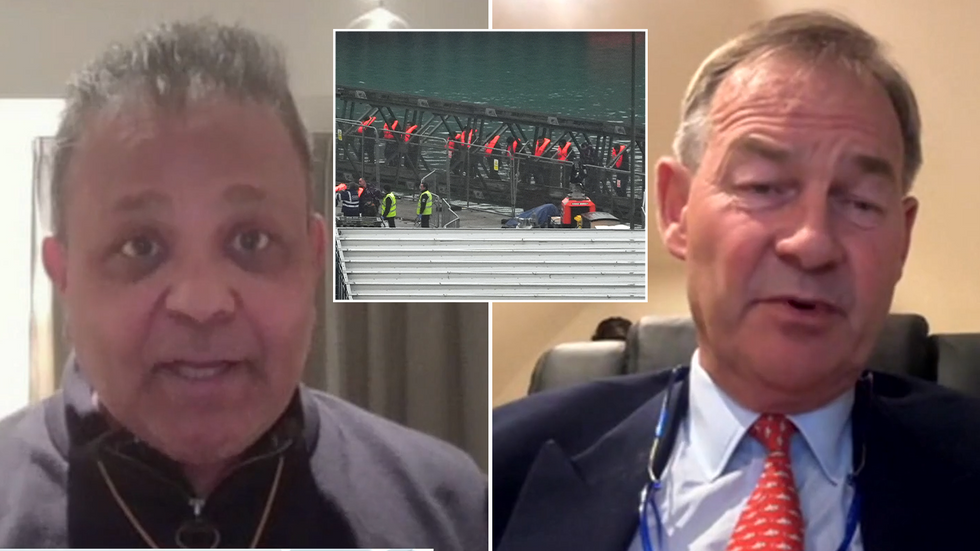
Rupert Lowe said human rights lawyers like Sampson are ‘pork barrelling a living’
GB NEWS
The clash comes as new figures reveal up to one in 12 people living in London are illegal migrants.
A previously confidential report commissioned by Thames Water estimates between 390,355 and 585,533 illegal migrants are living in the capital, with a median figure of 487,944.
LATEST DEVELOPMENTS
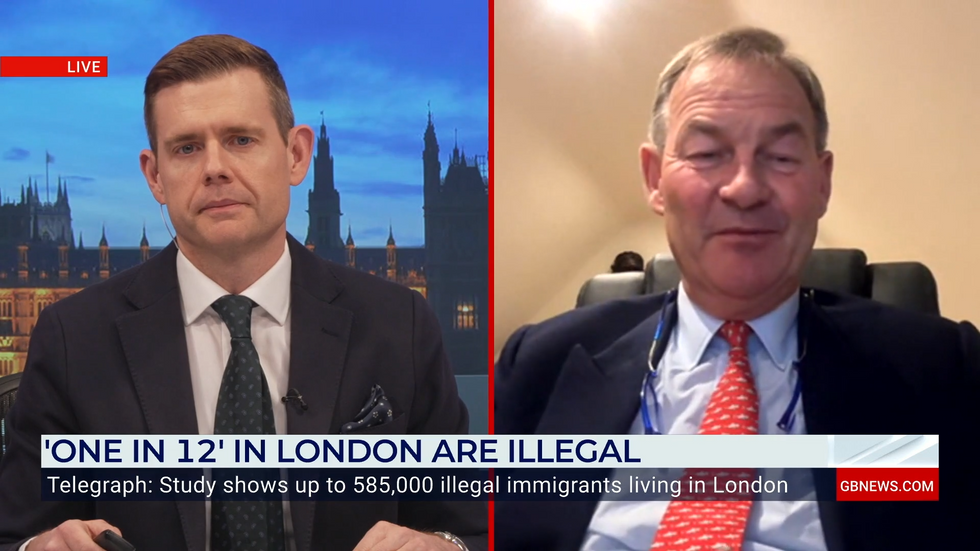
Reform’s Rupert Lowe joined Matt Goodwin on GB News
GB NEWS
The study, conducted by Edge Analytics and Leeds University experts, suggests most illegal migrants initially arrived on work, study or visitor visas before overstaying.
The research indicates around one million illegal migrants could be living in the UK, with 60 per cent concentrated in London.
The findings were obtained through Freedom of Information requests to Thames Water, who commissioned the study to better understand their “hidden” service users.
Reform UK chairman Zia Yusuf warned the situation represents “not just a national emergency, it’s a national security emergency.”
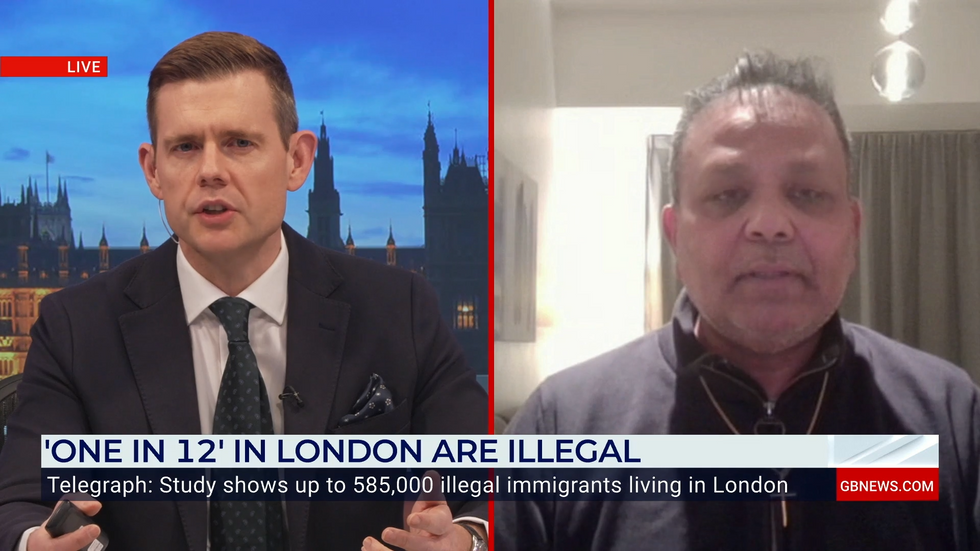
The human rights lawyer argued in favour of giving all illegal migrants amnesty
GB NEWS
He expressed particular concern about demographics, noting: “90 per cent of the people crossing the Channel are men.”
“The number of military age males making that journey legally surpasses the number of available soldiers, both standing and territorial,” Yusuf told GB News.
Deputy Reform UK leader Richard Tice added: “One in 12 people in London are here illegally, probably working illegally using taxpayer-funded public infrastructure and services. It is totally unacceptable.”
The Home Office reports having removed 16,400 illegal migrants in the past six months, the highest figure in half a decade.
More than 1,000 people have already crossed the Channel in small boats during the first 23 days of 2025.
This follows 38,816 Channel crossings in 2024, the second highest total on record.
A Home Office spokesman said: “This Government is strengthening global partnerships and rooting out the criminal gangs who profit from small boat crossings which threaten lives.”
Shadow Home Secretary Chris Philp called the figures “deeply alarming” and urged the Labour government to “urgently start deporting far more illegal immigrants.”
NewsBeat
How the Southport attack unfolded
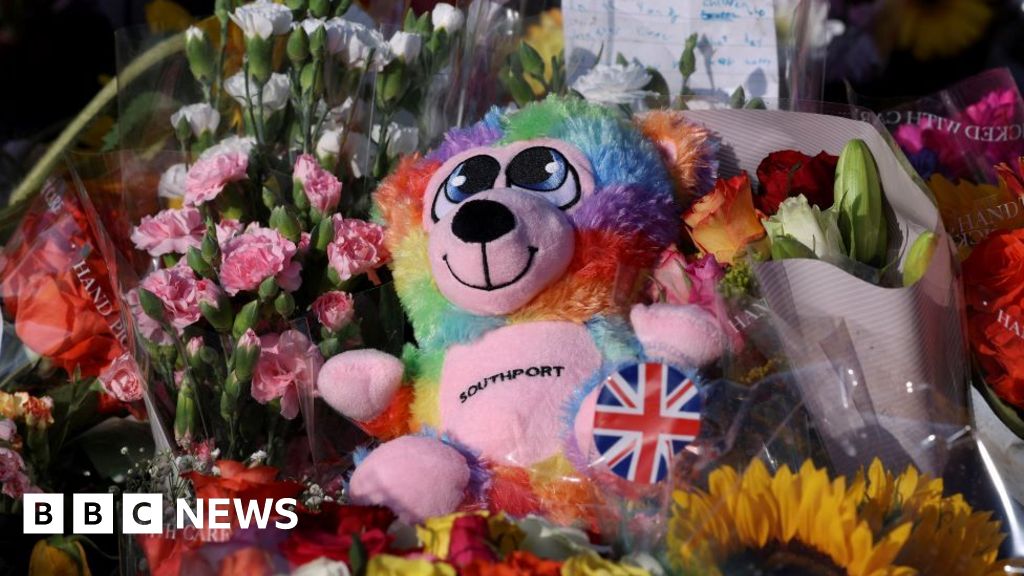
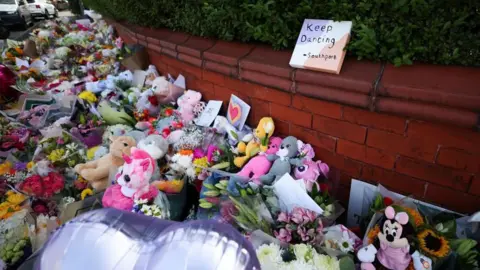 EPA
EPA“The dance club was full of laughter and excitement,” is how one girl, 14, described the atmosphere as a group of 26 children gathered for a Taylor Swift-themed class in Southport.
Their summer holidays had just begun and the sun was shining down on the town as they were dropped off by their parents. As the class got under way, 29 July 2024 had all the markings of a good day.
The attack that unfolded next saw Axel Rudakubana given a minimum of 52 years in prison. At his sentencing on Thursday, details of how the incident played out from the perspectives of those involved were revealed to the public for the first time.
With the class in full swing, a taxi driver followed a passenger he had just dropped off outside after he had refused to pay.
The passenger, in his teens, was not dressed for the weather: the hood of his thick green hoodie was pulled tight around his face and he was wearing a surgical mask. Inside his pocket was a 20cm kitchen knife.
Initially, Axel Rudakubana could not figure how to get into the studio and was caught on CCTV struggling with a locked door – but then he spotted another entrance and stepped inside.
That was, as one child survivor put it, the “beginning of my nightmare”.
Warning: This article contains distressing and upsetting details.
‘It wasn’t a prank’
Accounts from inside the dance class confirm that Rudakubana moved calmly and purposefully.
He had been planning this moment for some time. He did not hesitate, grabbing and stabbing the girl nearest to the door as soon as he walked in.
As Rudakubana attacked, he did not say a word.
For those inside the room, it took a moment to comprehend what was happening.
“I thought the man who stabbed me was a cleaner,” one of the child victims recounted.
It must be a practical joke, she thought, but later said: “I realised it wasn’t a prank when I saw blood coming out of me”.
Her memories of what happened next are “fuzzy”, but the child said she remembers thinking: “I don’t want to die, I have got to get out of here”.
Another victim said the image of Rudakubana in her memory is that of a monster stalking around the studio.
In court, she would later tell her would-be killer: “The thing I remember most about you is your eyes.
“You looked possessed and you didn’t look human.”
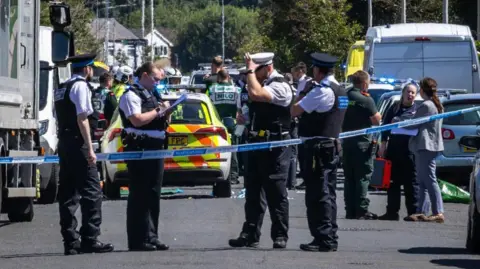 PA Media
PA MediaLeanne Lucas, who was leading the dance class, had first spotted Rudakubana outside when she went to open a window to let some air into the warm dance studio.
She thought nothing of it until the door swung open and he appeared.
What happened next, she said, left her and the girls with “scars we cannot un-see, scars we cannot move on from”.
The full horror of what was unfolding only became fully clear when she was stabbed in the back. She later told the girls: “I’m surviving for you”.
Heidi Liddle, who was also supervising the class, had been sitting on the floor helping the children to make friendship bracelets.
By the time she realised what was happening, the fast-moving attacker had already done unspeakable damage.
Heidi jumped into action and began trying to rush the girls towards the door.
One girl ran for a toilet on the other side of the landing and she followed.
Heidi locked the door behind them and pressed herself against it. Do not make a sound, she told the girl.
And then the door rattled. Rudakubana was still looking for victims.
Outside, she heard the screams of children who had not managed to escape.
‘Running for my life’
Rudakubana set out to kill as many children as he could: by the time the 15 minute frenzy was over, two girls were dead and one was dying.
Another eight children and two adults had been stabbed. Some were fighting for their lives.
If it was not for the quick-thinking and bravery of the girls, it is certain that more would have died.
One child remembers the world seeming to move in “slow motion” as Rudakubana moved towards her, attacking her friends as he made his way across the room.
Instinct kicked in.
She remembers “physically pushing” her friends who were still able to run as they fled down the stairs.
When she confronted Rudakubana in court by reading her statement, she told him: “I knew I was running for my life.
“I knew from your eyes you wanted to try to kill us all.”
When he was sentenced, the judge concluded that if Rudakubana had been able to, he would have killed each and every child present – and anyone else who got in his way.
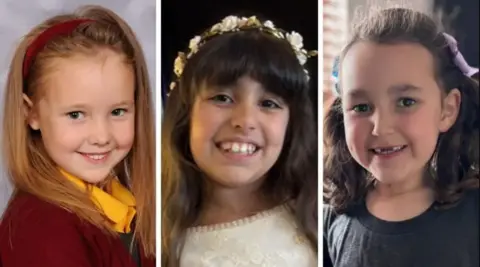
One of the children who survived that day was stabbed 30 times. She was airlifted to hospital and doctors operated on her for six hours to try and save the use of her arms, hands and fingers.
“She watched two of the girls die,” her parents told investigators.
On one occasion during her recovery, the child told her parents: “I don’t know who I am anymore.”
But six months on, she is fighting back. Her mother said: “We could never be more proud of what she has achieved over the last six months.
“He has completely failed to destroy her spirit, her amazing sense of humour, her fierceness and her pure beautiful heart.”
The Southport survivors are slowly rebuilding their lives.
Investigators who dealt with the case said they were staggered by their spirit and resilience.
That was on full display when one girl was asked what she says when her classmates ask if she wishes she had not been there that day.
“In some ways, I wish I wasn’t,” she tells them.
“But also, if I wasn’t there, someone else would have been stabbed and they could have died – so I’m glad I might have stopped someone else getting hurt.”
NewsBeat
Rachel Reeves to soften non-dom tax crackdown after ‘listening to concerns’ | Politics News

Rachel Reeves is to water down her crackdown on the non-dom tax status after analysis showed it had prompted an exodus of millionaires.
The chancellor said she would be tabling an amendment to the plans after “listening to the concerns” of non-domiciled residents.
Politics Live: Ed Miliband won’t resign over Heathrow decision
The announcement was welcomed by tax advisers – but one expert told Sky News that the government should go further and make it easier for wealthy people to move to the UK, especially in light of the Trump presidency.
“Non-dom” status allows someone who lives in the UK to avoid paying tax on money made abroad because their permanent home is considered outside of the country.
Labour’s manifesto vowed to abolish the status to “address unfairness in the tax system” and raise funds for public services.
The planned changes relate to rules governing the “temporary repatriation facility” – a transition window which will allow non-doms to bring overseas income into the UK and pay a reduced tax rate.
The arrangement was due to last for three years from April 2025, as announced in the October budget.
However, speaking at the World Economic Forum in Davos, Ms Reeves said she would be making this more generous.
She told the Wall Street Journal: “We have been listening to the concerns that have been raised by the non-dom community.
“And in the finance bill, we will be tabling an amendment which makes more generous the temporary repatriation facility, which enables non-doms to bring money into the UK without paying significant taxes.”
Ms Reeves extended the two-year transition window that the Conservative government had planned to three years in her budget back in October.
‘Millionaire exodus’
The new extension comes after analysts found over 10,000 millionaires left the UK in 2024, a 157% increase on 2023 – meaning the UK lost more wealthy residents than any other country except China.
The research, conducted by global analytics firm New World Health and investment migration advisers Henley & Partners, shows the UK became a net outflow country of millionaires after the Brexit vote in 2016, but the big haemorrhage happened last year.
Up until 2016, the UK had always been a net inflow country when it came to high-net-worth individuals.
Peter Ferrigno, group tax director at Henley & Partners, told Sky News today’s announcement shows the government had listened to warnings that “people can leave and will leave if they feel like they are being unfairly treated”.
However, while welcoming the changes, he said there needs to be “joined up thinking with migration rules” so it is easier for millionaires to come here and contribute to the economy.
He said millionaires were “leaving anyway” because of Brexit and the “perception that things weren’t working” – but Donald Trump’s presidency in the US is a chance to attract some back.
‘Skewered priorities’
Controversy over non-doms erupted in 2022 when it emerged Rishi Sunak’s wife Akshata Murty, the daughter of an Indian billionaire, had the tax status.
After the row she said she would start paying taxes on her overseas income as she did not want to be a “distraction” from her husband – then the prime minister.
Labour repeatedly used the issue to attack the Tories while in opposition, and scrapping the status was a centrepiece of their election campaign, promising to use the £1bn a year proceeds to fund NHS and dental appointments, and school breakfast clubs.
Downing Street said the move does not “change the overall approach” to the government’s policy, which is to replace non-doms with “a new internationally competitive resident-based system”.
But Carla Denyer, co-leader of the Green Party, accused the government of “totally skewed priorities” after it refused to row back down on its cut to winter fuel payments.
And the Tories said that Labour’s budget was “falling apart in front of our eyes”, with Ms Reeves “forced to admit” her plans to raise money “make the UK less attractive”.
A Treasury spokesperson said: “While we do not expect these changes to impact the £33.8bn of tax revenue that the OBR forecast to raise over five years, they reflect our continued engagement with stakeholders to make sure the reforms announced at budget operate as intended.
“The temporary repatriation facility is designed to encourage non-doms to bring their funds to the UK, encouraging them to spend and invest this money here.”
NewsBeat
Murder suspect arrested over woman’s death after manhunt by armed police
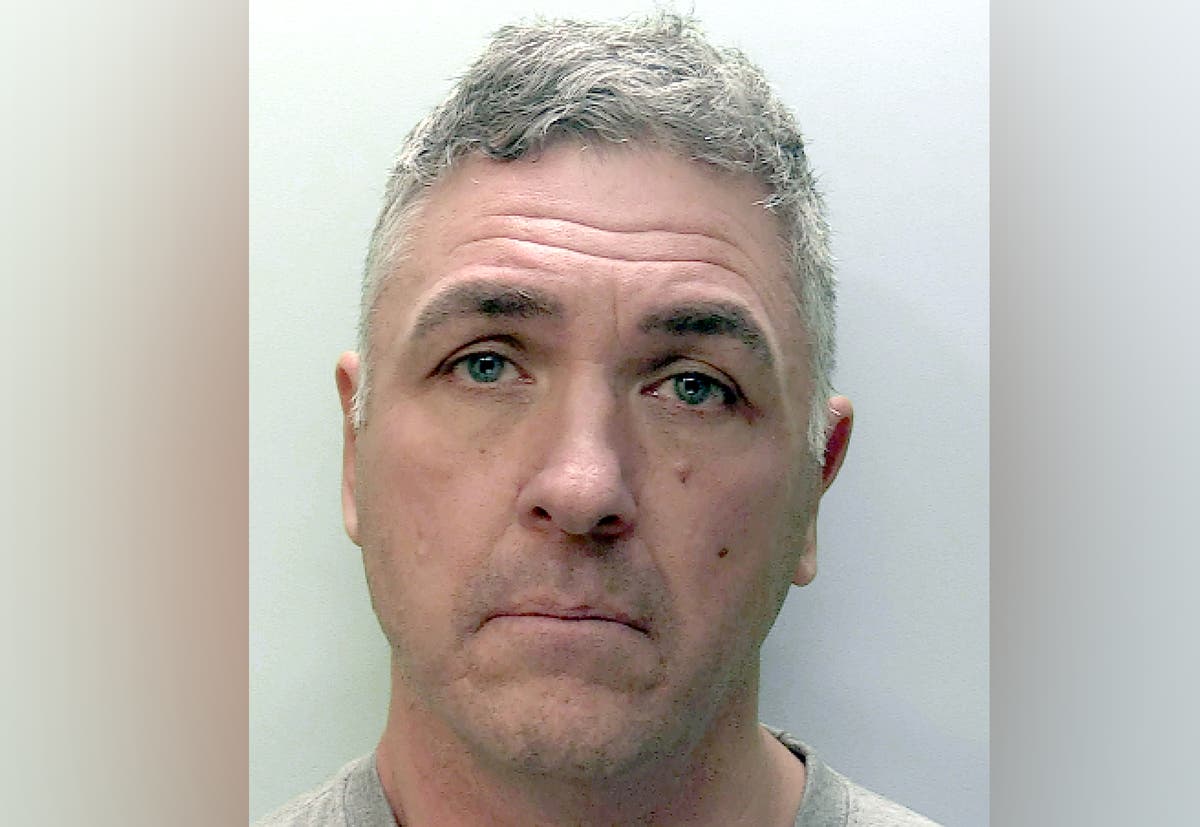
A man has been arrested on suspicion of murder after a woman was found seriously injured in the street and later died.
Devon and Cornwall Police launched a manhunt for Paul Antony Butler, 53, after the woman was discovered in Plymouth, Devon, on Wednesday.
He was located and arrested in Liskeard, Cornwall, around 20 miles from Plymouth, and is now in police custody, the force said.
The force will make a mandatory referral to the Independent Office for Police Conduct (IOPC) because of previous contact with the victim.
This is a breaking news story… More to follow
-

 Fashion8 years ago
Fashion8 years agoThese ’90s fashion trends are making a comeback in 2025
-

 Entertainment8 years ago
Entertainment8 years agoThe Season 9 ‘ Game of Thrones’ is here.
-

 Fashion8 years ago
Fashion8 years ago9 spring/summer 2025 fashion trends to know for next season
-

 Entertainment8 years ago
Entertainment8 years agoThe old and New Edition cast comes together to perform You’re Not My Kind of Girl.
-

 Sports8 years ago
Sports8 years agoEthical Hacker: “I’ll Show You Why Google Has Just Shut Down Their Quantum Chip”
-
Business8 years ago
Uber and Lyft are finally available in all of New York State
-
Entertainment8 years ago
Disney’s live-action Aladdin finally finds its stars
-
Sports8 years ago
Steph Curry finally got the contract he deserves from the Warriors
-
Entertainment8 years ago
Mod turns ‘Counter-Strike’ into a ‘Tekken’ clone with fighting chickens
-
Fashion8 years ago
Your comprehensive guide to this fall’s biggest trends

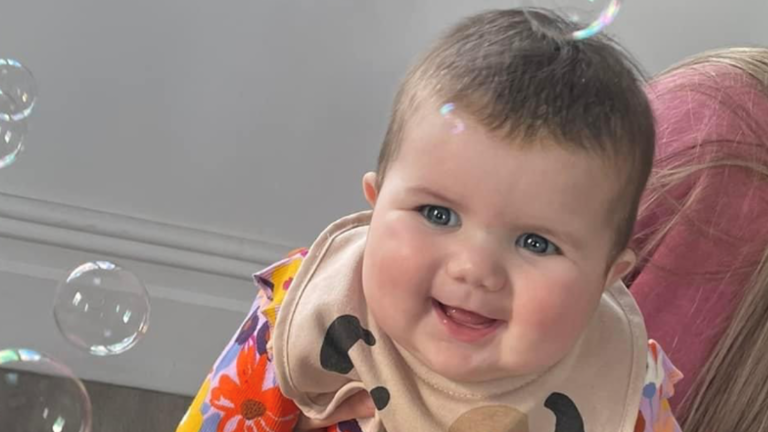
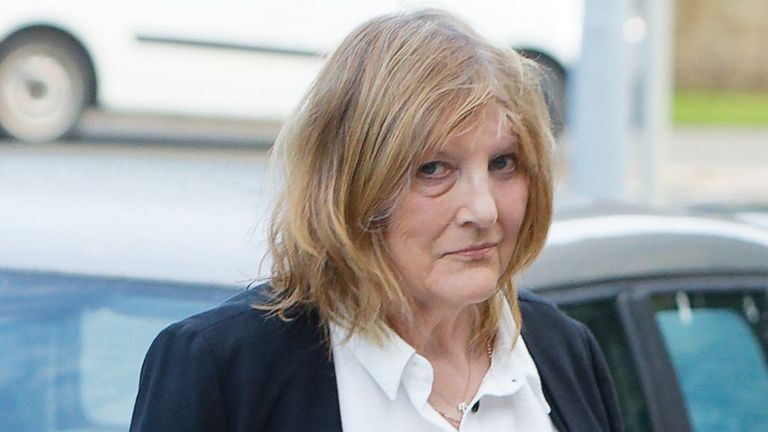
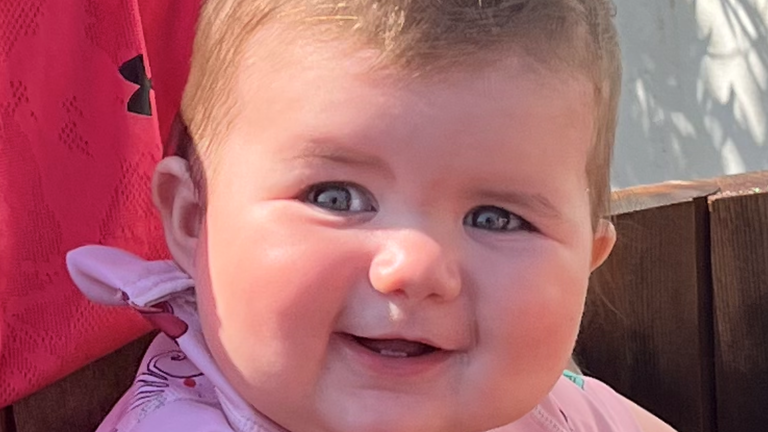










You must be logged in to post a comment Login